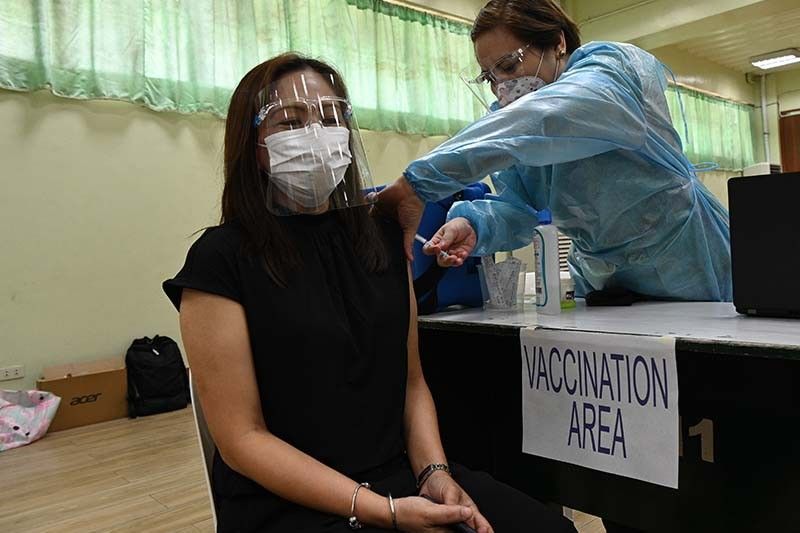IATF weighing its options on mandatory vaccination — Nograles

MANILA, Philippines — The government's pandemic task force is weighing its options on the proposal to make COVID-19 vaccination mandatory, but such a policy may no longer be necessary if many Filipinos avail of the jabs, Malacañang said Tuesday.
President Rodrigo Duterte has expressed willingness to support a policy on mandatory vaccination, saying he could compel everyone to get jabbed under the police power of the state. He said he may agree with the Inter-Agency Task Force for the Management of Emerging Infectious Diseases (IATF) if it recommends the policy since the inoculation against COVID-19 is meant to protect public health.
IATF spokesman and acting presidential spokesperson Karlo Nograles said members of the task force are still discussing the proposal.
"As long as we are seeing the continuous massive vaccination, we’re seeing one million vaccinees per day and then now, we have a three-day massive vaccination rollout... our target is (to vaccinate) three million (persons) per day, then hopefully, there might not be a need for that if realistically on the ground many are getting vaccinated," Nograles said during a public briefing aired over state-run PTV.
Nograles was referring to the three-day national vaccination days that started on November 29.
"But then again, we also have to consider that we have a new variant of concern, the Omicron, so at the end of the day, what we will balance is, as the President said, the police power of the state plus the public health and safety of all our countrymen. So, we continue to weigh the options right now in the IATF," he added.
New law needed
Nograles, a former lawmaker, said a new law is needed to enforce the mandatory vaccination.
"There will be mandatory enforcement if there is a law from Congress signed by President Duterte. So it (is) up to Congress to pass a law if they feel the need to have a law to make it (vaccination) mandatory. As far as the IATF is concerned, we continue to meet to talk about that proposal," the Palace official said.
"So we continue to process that and we continue to talk about that option. And that is the reason why we are doing this massive rollout of vaccines, the Bayanihan, Bakunahan, while we do not have that option yet," he added.
During a meeting with some officials and health experts last Monday, Duterte said a president, in the absence of a law, can issue rules and regulations if there is really a "pressing need for presidential intervention." He also assailed what he described as the "overzealousness" of some lawmakers who want everything done by legislation and who are criticizing the executive branch for issuing rules and regulations.
"I can issue rules and regulations to guide the departments under me, the secretaries, you have to do this because in the meantime, I said, they are maybe trying to craft a law. If I cannot issue rules during times of crisis, you castrate the president," Duterte said in Filipino.
"If there is no law and there is a crisis what would you do? Can you help? And then you will craft a law, you will talk for a month. That's nonsense," he added.
Die early or live long?
In the same meeting, Duterte warned unvaccinated persons of the risks brought about by the pandemic, saying the virus can cause hospitalization and early deaths.
"To those who refuse to get vaccinated because of - whatever, religious or - I mean no offense. But to those who do not want to get vaccinated, it's simple. Just choose: Live long or die?... We still do not know Omicron...You choose: early demise or live longer?" the president said.
"If you get infected, there is nothing you can do... Many of my friends have died. At no other time in my life have I lost so many friends and people I know," he added.
Duterte noted that one or two unvaccinated persons with COVID-19 can infect several people.
"So it’s unfair. It’s actually to protect public, public health. The ministerial functions of government are: the government can issue measures that would protect public health, public safety, public order," he said.
"Now, if you don't want it, do not go out."
Dutetre said he knows of an undersecretary who does not want to avail of pandemic shots.
"I may just go to your office ma'am and I will hold you. If not, I will tie you in your seat so you can be injected. One, two, up to you, three doses, include the booster so there would be no problem," he added.
Nograles said all sectors should work together to achieve the goal of inoculating nine million people during the three-day national vaccination campaign.
"It's not just the responsibility of the government but the responsibility of everyone.. We’re all in this together. Let's help each other. If we know somebody who has not been vaccinated, convince them to get vaccinated," he said.
About 2.5 million persons were vaccinated during the first day of the three-day campaign, lower than the three million daily target. The government aims to inoculate 54 million people against COVID-19 this year. It also aims to administer jabs to 80 percent of minors aged 12 to 17 years and complete the booster shots for healthcare workers, senior citizens, and persons with comorbidities.
- Latest
- Trending



























